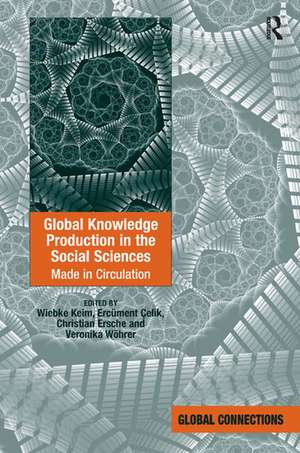Global Knowledge Production in the Social Sciences: Made in Circulation
Autor Wiebke Keim, Ercüment Çelik, Veronika Wöhreren Limba Engleză Hardback – 29 sep 2014
| Toate formatele și edițiile | Preț | Express |
|---|---|---|
| Paperback (1) | 261.82 lei 6-8 săpt. | |
| Taylor & Francis – 30 iun 2020 | 261.82 lei 6-8 săpt. | |
| Hardback (1) | 771.88 lei 6-8 săpt. | |
| Taylor & Francis – 29 sep 2014 | 771.88 lei 6-8 săpt. |
Preț: 771.88 lei
Preț vechi: 1107.28 lei
-30% Nou
Puncte Express: 1158
Preț estimativ în valută:
147.69€ • 155.03$ • 122.59£
147.69€ • 155.03$ • 122.59£
Carte tipărită la comandă
Livrare economică 10-24 aprilie
Preluare comenzi: 021 569.72.76
Specificații
ISBN-13: 9781472426178
ISBN-10: 1472426177
Pagini: 288
Dimensiuni: 156 x 234 x 23 mm
Greutate: 0.88 kg
Ediția:1
Editura: Taylor & Francis
Colecția Routledge
Locul publicării:Oxford, United Kingdom
ISBN-10: 1472426177
Pagini: 288
Dimensiuni: 156 x 234 x 23 mm
Greutate: 0.88 kg
Ediția:1
Editura: Taylor & Francis
Colecția Routledge
Locul publicării:Oxford, United Kingdom
Cuprins
Global Knowledge Production in the Social Sciences
Notă biografică
Wiebke Keim is a postdoctoral research fellow and lecturer in the Department of Sociology at the University of Freiburg, Germany and a CNRS researcher at the research center SAGE in Strasbourg. She is co-editor of Gauging and Engaging Deviance, 1600-2000. Ercüment Çelik is post-doctoral researcher and lecturer in the Department of Sociology at the University of Freiburg, Germany, and author of Street Traders: A Bridge Between Trade Unions and Social Movements in Contemporary South Africa. Christian Ersche is doctoral researcher at the University of Freiburg, Germany. Veronika Wöhrer is post-doctoral researcher and lecturer in the Department of Sociology at the Universities of Freiburg, Germany, and Vienna, Austria.
Recenzii
’An essential volume for anyone interested in alternatives to the presumed universalism of theory and methods derived from Western contexts and agendas. While recognizing powerful institutionalized obstacles, the authors challenge the epistemological foundations of Sociology, and describe both recent transnational initiatives and new scholarship aimed at transforming the discipline by incorporating new knowledge and paradigms now increasingly encountered in postcolonial settings.’ David Szanton, University of California, Berkeley, USA and editor of The Politics of Knowledge: Area Studies and the Disciplines ’This book widens the theoretical and methodological perspective of studies on the global circulation of knowledge, by offering interesting cases and discussing relevant concepts. A truly international contribution to rethinking the entangled processes at work in the production of social sciences in local, national and transnational spaces.’ Fernanda Beigel, CONICET-Universidad Nacional de Cuyo, Argentina ’After the wave of criticism of the Eurocentric and colonial character of hegemonic social sciences during the 1990s and in the early 2000s, more recent studies have tried to offer institutional and epistemic solutions to adequately represent the global South in the social sciences. This volume systematically discusses some of these experiences, presenting new critical responses to the challenge of overcoming parochialism and Eurocentrism. Bringing together a team of brilliant and internationally renowned authors, this book represents an indispensable contribution for those interested in following contemporary reinvention of social sciences.’ Sérgio Costa, Freie Universität Berlin, Germany
Descriere
An innovative contribution to debates on the internationalization and globalization of the social sciences, this book pays particular attention to their theoretical and epistemological reconfiguration in the light of postcolonial critiques and critiques of Eurocentrism. Bringing together theoretical contributions and empirical case studies from around the world, including India, the Americas, South Africa, Australia and Europe, it engages in debates concerning public sociology and explores South-South research collaborations specific to the social sciences. Contributions transcend established critiques of Eurocentrism to make space for the idea of global social sciences and truly transnational research.
